Serving 2,355 students in grades 9-12, Bowie High School ranks in the bottom 50% of all schools in Texas for overall test scores (math proficiency is bottom 50%, and reading proficiency is bottom 50%).
The percentage of students achieving proficiency in math is 18% (which is lower than the Texas state average of 41%). The percentage of students achieving proficiency in reading/language arts is 34% (which is lower than the Texas state average of 51%).
The student:teacher ratio of 15:1 is higher than the Texas state level of 14:1.
Minority enrollment is 93% of the student body (majority Hispanic and Black), which is higher than the Texas state average of 75% (majority Hispanic).
Quick Stats (2025)
- Grades: 9-12
- Enrollment: 2,355 students
- Student:Teacher Ratio: 15:1
- Minority Enrollment: 93%
- Graduation Rate: 86% (Btm 50% in TX)
- Overall Testing Rank: Bottom 50%
- Math Proficiency: 18% (Btm 50%)
- Reading Proficiency: 34% (Btm 50%)
- Science Proficiency: 34% (Btm 50%)
- Source: National Center for Education Statistics (NCES), TX Dept. of Education
Top Rankings
Bowie High School ranks among the top 20% of public schools in Texas for:
Category
Attribute
Diversity
School Overview
Bowie High School's student population of 2,355 students has declined by 11% over five school years.
The teacher population of 158 teachers has declined by 9% over five school years.
Grades Offered
Grades 9-12
Total Students
2,355 students
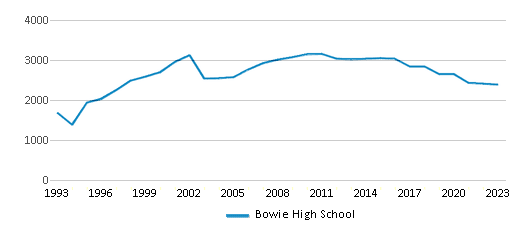
Gender %
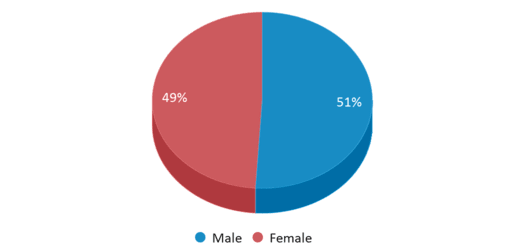
Total Classroom Teachers
158 teachers
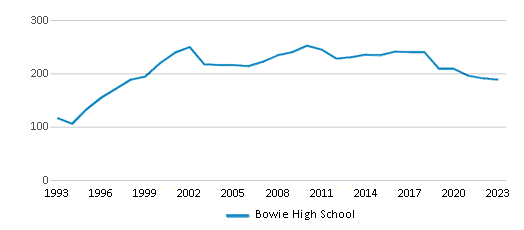
Students by Grade
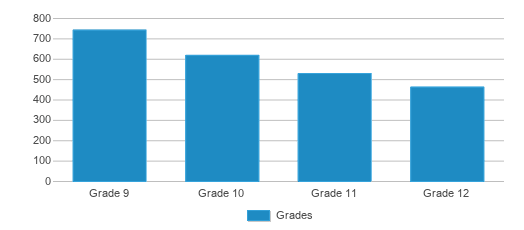
School Rankings
Bowie High School ranks within the bottom 50% of all 8,188 schools in Texas (based off of combined math and reading proficiency testing data).
The diversity score of Bowie High School is 0.69, which is more than the diversity score at state average of 0.64. The school's diversity has stayed relatively flat over five school years.
Overall Testing Rank
#7405 out of 8188 schools
(Bottom 50%)
(Bottom 50%)
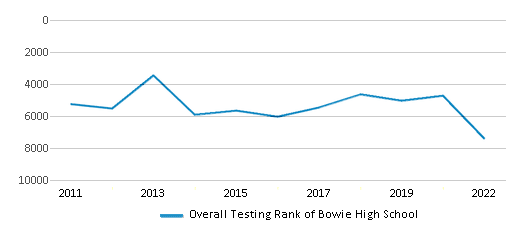
Math Test Scores (% Proficient)
18%
41%
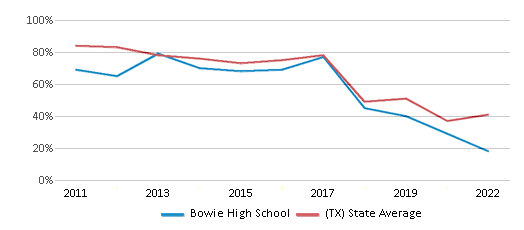
Reading/Language Arts Test Scores (% Proficient)
34%
51%
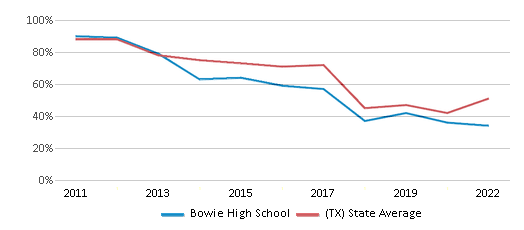
Science Test Scores (% Proficient)
34%
46%
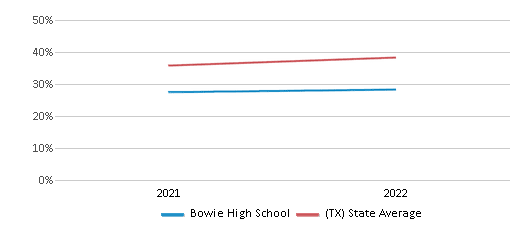
Student : Teacher Ratio
15:1
14:1
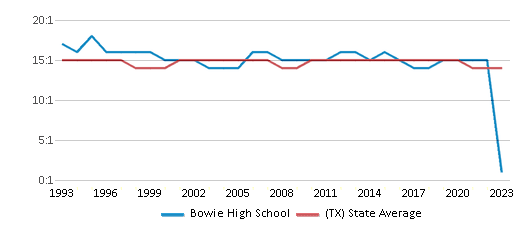
American Indian
n/a
n/a
Asian
14%
6%
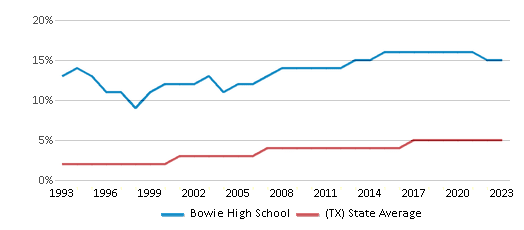
Hispanic
40%
53%
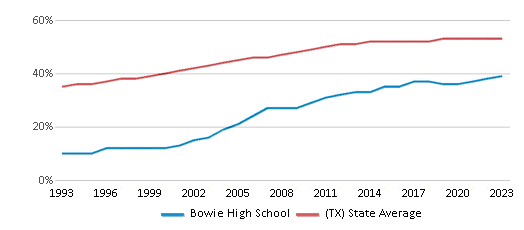
Black
36%
13%
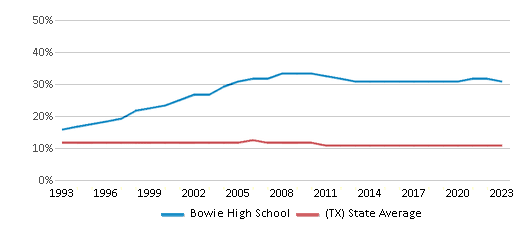
White
7%
25%
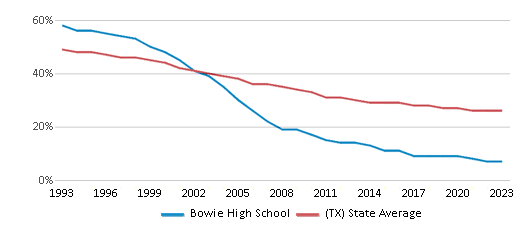
Hawaiian
n/a
n/a
Two or more races
3%
3%
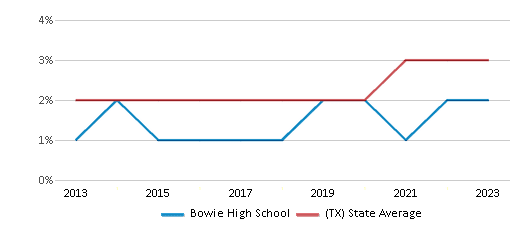
All Ethnic Groups
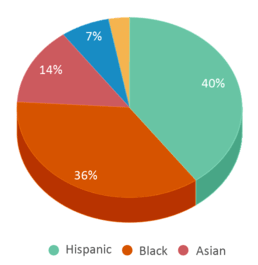
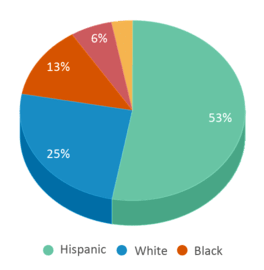
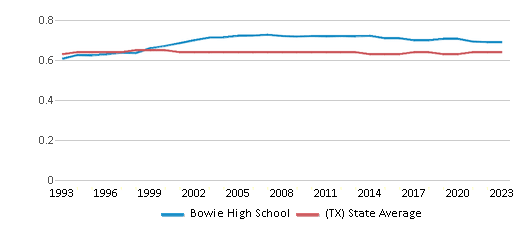
Graduation Rate
86%
90%
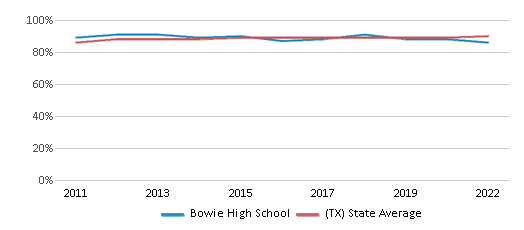
Participates in the National School Lunch Program (NSLP)
Yes
Eligible for Free Lunch
65%
57%
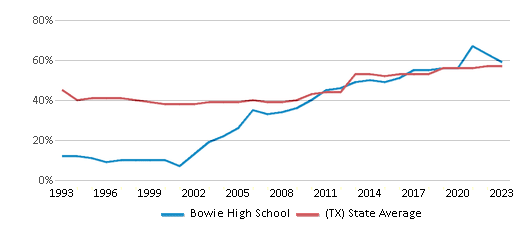
Eligible for Reduced Lunch
9%
5%
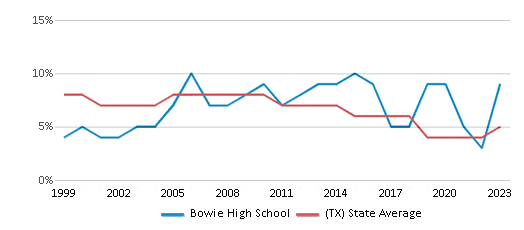
School Statewide Testing
School District Name
Source: National Center for Education Statistics (NCES), TX Dept. of Education
Frequently Asked Questions
What is Bowie High School's ranking?
Bowie High School is ranked #7405 out of 8,188 schools, which ranks it among the bottom 50% of public schools in Texas.
What schools are Bowie High School often compared to?
Bowie High Schoolis often viewed alongside schools like Seguin High School, Martin High School by visitors of our site.
What percent of students have achieved state testing proficiency in math and reading?
18% of students have achieved math proficiency (compared to the 41% TX state average), while 34% of students have achieved reading proficiency (compared to the 51% TX state average).
What is the graduation rate of Bowie High School?
The graduation rate of Bowie High School is 86%, which is lower than the Texas state average of 90%.
How many students attend Bowie High School?
2,355 students attend Bowie High School.
What is the racial composition of the student body?
40% of Bowie High School students are Hispanic, 36% of students are Black, 14% of students are Asian, 7% of students are White, and 3% of students are Two or more races.
What is the student:teacher ratio of Bowie High School?
Bowie High School has a student ration of 15:1, which is higher than the Texas state average of 14:1.
What grades does Bowie High School offer ?
Bowie High School offers enrollment in grades 9-12
What school district is Bowie High School part of?
Bowie High School is part of Arlington Independent School District.
In what neighborhood is Bowie High School located?
Bowie High School is located in the Southeast Arlington neighborhood of Arlington, TX. There are 25 other public schools located in Southeast Arlington.
School Reviews
2 10/26/2016
Not the school for kids w/ behavior issues. Teenagers that use curse words, failing students w/ behavior issues overlooked, teachers take things personally. If this is something as a parent you want to deal with send your kid here. Or, pay attention to what your kids are telling you when they say the teachers are NOT treating them fairly most of the time. When they say its a gang in the school its a gang in the school.
2 3/2/2011
Fights, assaults at school and at sporting events. Only one police officer at school of over 3,000 students. The parents are not informed of the crime on school premises. Problem students housed in temporary buildings on Highbank outside the main school building.
Review Bowie High School. Reviews should be a few sentences in length. Please include any comments on:
- Quality of academic programs, teachers, and facilities
- Availability of music, art, sports and other extracurricular activities
Recent Articles

What Is A Charter School?
Explore the world of charter schools in this comprehensive guide. Learn about their history, how they operate, and the pros and cons of this educational innovation. Discover key facts about charter schools, including admission policies, demographics, and funding, as well as what to look for when considering a charter school for your child.

10 Reasons Why High School Sports Benefit Students
Discover the 10 compelling reasons why high school sports are beneficial for students. This comprehensive article explores how athletics enhance academic performance, foster personal growth, and develop crucial life skills. From improved fitness and time management to leadership development and community representation, learn why participating in high school sports can be a game-changer for students' overall success and well-being.

February 05, 2025
Understanding the U.S. Department of Education: Structure, Impact, and EvolutionWe explore how the Department of Education shapes American education, from its cabinet-level leadership to its impact on millions of students, written for general audiences seeking clarity on this vital institution.





